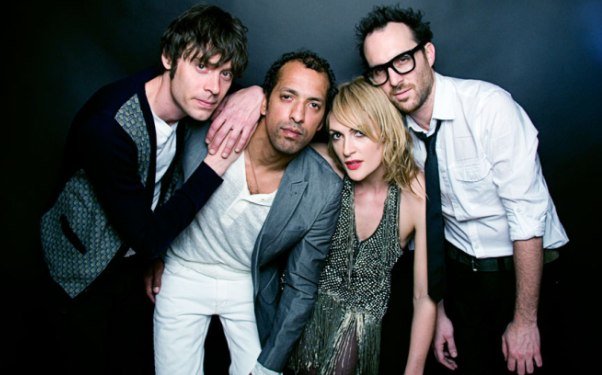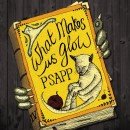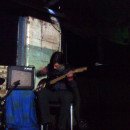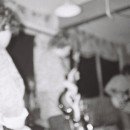A few hours before their first Manchester gig in years, I had the chance to meet with Emily Haines and James Shaw of Metric for a quick stroll down the canal behind HMV Ritz and a nice chat about their new album ‘Synthetica’ (out now).
In the blog post announcing Synthetica, the album is described as being about “Insomnia, fucking up, fashion, sex, watching people die, dancing your ass off and the apocalypse” and is summed up as being about “real vs artificial” How important is it that the title means something towards the content?
James Shaw: When we first started making the record we didn’t have too much of a cohesive idea of what we were making and what the idea behind it was going to be, we were just making music for the sake of making music, it’s what we enjoy doing the most. Over the process of making the record, about halfway through, there were some thematic through-lines, and some cohesive ideas that kept popping up and recurring, causing us to do further examination into what we were talking about. As we got nearer to the end of the process, we started seeing even more of that through-line and paying attention to it more and started writing within the guidelines of what those things meant to us.
The word Synthetica, which came from the brain of Ms. Emily Haines, just sort of wouldn’t go away. We kept trying to poke holes in it and seeing if it was really the right thing. Not only did the sound of the word not only sound like the sound of the record, it also continued to have multiple meanings to us, which is something we appreciate with album titles. We started to veer the album under the umbrella of what that word meant to us, and the visuals it evoked for us, and the different concepts of what that word started to mean.
That leads really well onto my next question: Who designed the album art, and what does it mean in relation to the title?
Emily Haines: It was a guy named Justin Broadbent, a great artist friend of ours. The idea is, that like the album itself, the artwork should be thought provoking, make you stop and take a look at what you take for granted, notice there’s an illusion taking place.
J: Yeah, a lot of the themes we were dealing with is ‘the real vs the artificial’ Trying to discern if things are as they seem or not as they seem and trying to figure out what’s happening in front of you. I think the artwork kinda displays a lot of that because you can’t really tell where the setting is, you can’t tell if it’s right-side up, or upside down, or if you’re upside down or what the hell is going on.
E: It makes you stop instead of, y’know, blindly consuming
The album starts with ‘Artificial Nocturne’ and the opening lyrics “I’m just as fucked up as they say” Was it a conscious decision to start off so striking, and catch people’s attention right from the get-go?
E: Yeah
J: Yeah, I think so, I mean, once that song came to be and we started realising what it was it seemed like the only way to start the record. In a sense it’s a proclamation of who we are and the fact that we’re not ashamed of it and—
E: Flaws, nothing wrong with them.
J: And again, pointing out the difference between the real and the artificial. The consistent thing among the real is that there is always flaws.
The title track, ‘Synthetica’ is track seven. It seems each track prior posits a different thought or concept, and then it’s all summed up with the title track towards the end. How much thought goes into building a tracklisting?
E: Yeah lots. It really makes me happy that it’s coming across to you as a listener because y’know, that’s the point. We have a lot of respect for the people who listen to our music, buy our records and come to our concerts, so it’s all put together with a lot of care and meaning, and it makes me feel good to know that it comes across.
When you’re in the studio, writing songs, how much consideration do you put into how they’re going to sound live. ‘Youth Without Youth’ has the huge “On the count of three, jump with me…” section, and I was wondering if that’s intentional to really get the crowd moving live?
J: Not really, we have done that in the past. With ‘Live It Out’, we were very concerned about how the record was going to translate live. With this one, we made more of a concerted effort to not be concerned with it, because we didn’t want to feel any restraints. You can pull off anything, and you don’t have to play the same song, and you play renditions and you can change whatever you want. The album is an album, it’s a different medium so it should be cohesive unto itself.
How did the collaboration with Lou Reed come about? I have to admit, I remember reading about it, but then I forgot so it was a nice surprise when he popped up on ‘The Wanderlust’
E: Oh good! That’s ideal, that’s what we wanted it to be. We wanted it to be a surprise for everybody but then every interview everyone wants to talk about it. We met him at a Neil Young tribute, and he asked me who I’d rather be, The Beatles or The Rolling Stones, which is a lyric from our song ‘Gimme Sympathy’
On the theme of ‘real vs artificial’, in the physical album, you put the lyrics backwards and put a reflective foil in there to read them with. Was that a concerted effort to make something real, that’s physical, or more of an incentive to buy the record?
E: Well, we always put a lot of care into the artwork, I mean I think people realise with a band like us, it’s not like you could stop buying our records and we could keep going. There’s no company, there’s no fake money, there’s no line of credit, there’s just our actual lives and if people stop buying Metric records then the band will end. So we try to make things as beautiful as we can, and I think people appreciate it. I like that, when you open it, you see your own reflection.
As a band, you’ve been together over a decade, so you’ve come up side by side with the rise of digital music. How was the advent of iTunes, Spotify, filesharing, etc affected the band, both positively and negatively?
E: It feels like a lot of those technologies were designed for a band like us. We’re pretty independently minded, not impressed with the major record labels, so things like iTunes, we were simulating with mail order for years before that happened. The only downside is the sense that the internet is becoming a giant heap of garbage. Like you said, there are definitely upsides and downsides but for us the upsides definitely outweigh the downsides, but it does feel like an erosion of meaning in general and I think it’s been interesting that we’ve had a chance to see the shift culturally. With things speeding up exponentially, people’s attention spans are going to be shorter and shorter. We write three minute pop songs, but even that seems kinda long.
Metric songs have a long history of popping up in TV and Film (Perhaps most famously in Scott Pilgrim vs The World) but more recently, you’ve taken to writing original songs for films such as ‘Twilight: Eclipse’ and ‘Cosmopolis’ Is this something you’re looking to do even more of in the future?
E: Yeah, scoring with Howard Shore is a pretty cool thing to do, Jimmy can speak more to that—
J: Like you said, we’ve been a band for 10+ years and it’s a rare thing that you get to try something new, musically. A lot of the times you’re just on the road for a year and playing the same material and musical challenges like that don’t come along in a while so when they do it’s really exciting for us to try something we’ve never done before.
E: When we wrote the song with Howard Shore for Twilight, we hoped that we would come to us again for a more involved project and that’s exactly what happened.
What were you experiencing, be it books, TV, film or whatever that really influenced the themes and ideas of Synthetica?
E: Well there’s some images I came across from the Radical Architecture Movement, this organisation called Super Studios from Italy in 1960s. We got in touch with them, and they gave us permission to use their images. Did you see the stereobox that we made?
No, I didn’t
E: We made a special, limited edition, viewfinder, that has the CD, and a little booklet, and plantable seed paper so that when you plant the paper it turns into flowers and images from the Radical Architecture Movement that are in there as 3D slides that you can see whilst listening to the record. Stuff like that all kinda wove into that album.
Did you have any musical influences that affected this album in particular, as opposed to the earlier albums?
J: I’ve been really inspired by Angelo Badalamenti, who’s the guy that scores all the David Lynch films. We definitely went for a cinematic quality, an otherworldly places that you feel like you’re in, as opposed to just a collection of songs
E: Ideally when you hear the music, you don’t just picture a band standing there. Ideally, it triggers some images of your own imagination.
Finally, do you get as much time as you’d like to experience other cities while you’re out on tour?
E: Well, it’s a lot of this, y’know, but I don’t need to go on holiday anytime soon
J: Holidays are holidays, that’s the biggest misconception that while you’re on tour you’d wanna have cultural experiences every day. You’re here to work and you’re here to do something other than vacation—
E: You try—
J: You try, and in some places we do, we had a great day off in Istanbul a week ago, we went all over the city and saw all these amazing things but that’s pretty rare. On my seventeenth time in London, I don’t really need to go to the Tate Modern, you know what I mean? It’s not what I’m there to do.
METRIC. THE RITZ. 7.7.12.
You’ve gotta give credit where credit is due. Metric are a punctual band. Arriving on stage at exactly 20:00, the roar of The Crowd was intense. You hear that in reviews all the time, but this was something else. Metric haven’t been in England in YEARS and no-one was more aware of this than The Crowd. As soon as Metric came on stage, every person in that room surrendered themselves and became The Crowd for a night, united by that shared love of this enigmatic band.
Metric set the tone for the night by opening with the first three tracks from latest album ‘Synthetica’ and over the course of the night would go on to play 90% of that new album. The Crowd didn’t mind. The album’s been out for just under a month, and already it seemed like every voice in the building was singing along when ‘Speed The Collapse’ came about, and the frenzy brought about by ‘Youth Without Youth’ was on par with any of their classics that they’d play later in the night.
Over the course of 10+ years as a band, Metric have grown a hell of a lot. To look at them onstage is to look at Rock Stars. Not rockstars in the sense of “I’m gonna get really drunk and throw this TV out the window” but the Rock Stars you wanted to be when you were a kid. They smile so wide while they play, they’ve been doing this long enough now that they know what their doing. The music is as sleek and efficient as you’d hear on record, but their playing is loose and carefree, everything a Rock Show should be. The enthusiasm every single band member has towards every single song, old or new, is palpable.
Then there’s Emily Haines. It seems like every time someone talks about Metric, they talk about the band, then they talk about Haines, but there is good reason for this. She’s one of the last great frontmen. I use the word ‘frontmen’ because to brush Haines off to the side with the label ‘frontwoman’ is a disservice to not only her, but to every woman who leads a band and does it with style. In her leather jacket, and denim hotpants, that night at The Ritz, Emily Haines was Mick Jagger, Emily Haines was Debbie Harry, but most importantly, Emily Haines was Emily Haines.
Throughout the night, the sprinkling of classic songs was met by unbridled appreciation from The Crowd. ‘Dead Disco’ had EVERYONE up and singing, and together turned that 3:26 pop song from ten years ago into an anthem, a rallying cry in a time when all of our musical idols are dead or might as well be. Metric are the thinking man’s party band. Their songs have that meaning so many bands lack, but if you don’t care for that, that’s cool, just shut up and dance.
Pre-encore closer ‘Stadium Love’ was euphoric, like the last song at the best festival you’ve ever been to. You could almost physically see the gratitude being shared between The Crowd and the band and as cheesy as it sounds, it was at that point that I truly understood what the concept of ‘Stadium Love’ actually is.
Metric finished the night with a pitch-perfect, acoustic rendition of Fantasies highlight ‘Gimme Sympathy’. Hundreds of voices in unison singing “Come on baby, play me something, like ‘Here Comes The Sun’” over and over again. If it wasn’t for set times, and curfews, there’s a good chance we’d all still be there singing along.
Comments from Facebook
comments






Comments from Facebook
comments
No Comments yet. Say something.